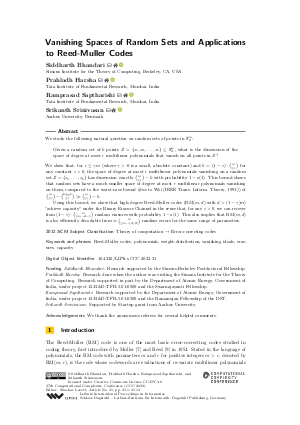@InProceedings{bhandari_et_al:LIPIcs.CCC.2022.31,
author = {Bhandari, Siddharth and Harsha, Prahladh and Saptharishi, Ramprasad and Srinivasan, Srikanth},
title = {{Vanishing Spaces of Random Sets and Applications to Reed-Muller Codes}},
booktitle = {37th Computational Complexity Conference (CCC 2022)},
pages = {31:1--31:14},
series = {Leibniz International Proceedings in Informatics (LIPIcs)},
ISBN = {978-3-95977-241-9},
ISSN = {1868-8969},
year = {2022},
volume = {234},
editor = {Lovett, Shachar},
publisher = {Schloss Dagstuhl -- Leibniz-Zentrum f{\"u}r Informatik},
address = {Dagstuhl, Germany},
URL = {https://drops-dev.dagstuhl.de/entities/document/10.4230/LIPIcs.CCC.2022.31},
URN = {urn:nbn:de:0030-drops-165934},
doi = {10.4230/LIPIcs.CCC.2022.31},
annote = {Keywords: Reed-Muller codes, polynomials, weight-distribution, vanishing ideals, erasures, capacity}
}

 Creative Commons Attribution 4.0 International license
Creative Commons Attribution 4.0 International license
